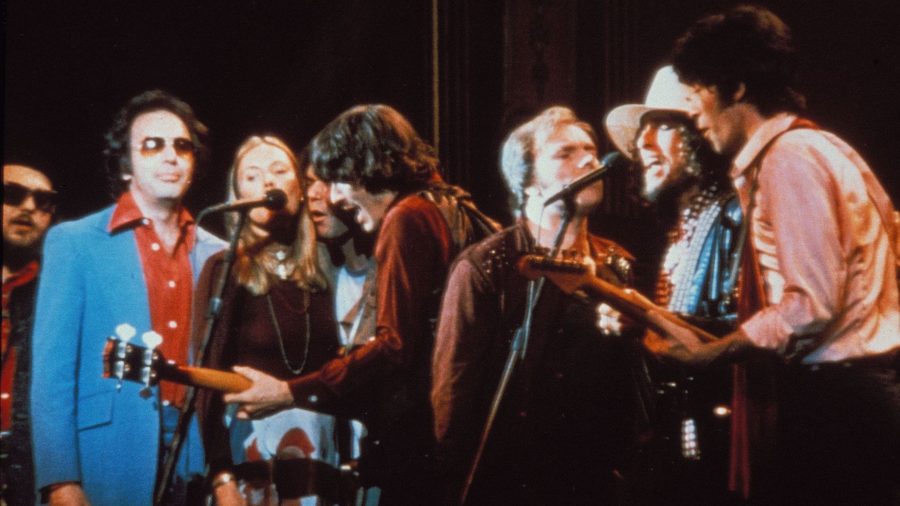Martin Scorsese / USA / 1978 / 117 mins
Available on Blu-ray Mon 12 Nov 2018
Scorsese’s movie of The Band‘s farewell gig is often held up as the non-pareil of rock docs. For a long time, it was. But forty years is beginning to tell on this venerable institution, with its behind-the-scenes chats and who’s who onstage guest list. What might have once passed as candid, now feels contrived. What once was a thrilling all-star musical love-in now feels a bit Jools Holland and Friends. Even the title card exhortation that “This film should be played loud!” feels more Spinal Tap than serious. Are those cobwebs gathering in the corners of this beloved piece of cinema?
Maybe. Or maybe it’s just the dusty grandeur of the Winterland Ballroom backdrop, with its candelabras and chandeliers and cornices. Or the fin-de-siècle vibe of the sad and beautiful music box theme. There’s now two levels of retro to The Last Waltz – the one deliberately created by The Band to evoke ye olde America, and the one that comes from watching 70s rock pomp with 21st century eyes.
The concert footage itself remains beautiful to look at, lit in rich autumnal colour. The slow pans across and around the stage add a third dimension to the usual end-on gig experience, giving depth and allowing us to orbit the group in full flow for one last time.
The music too is still not to be sniffed at. The Band’s best-known works are now canonical Americana, and the versions on offer here are strong. The Weight’s crunchy rhythms are lubricated with The Staple Singers’ soulful grace. And when the time comes to expunge any tiny trace of the Civil War South from history, please spare The Night They Drove Old Dixie Down. Amid reverential brass, Levon Helm reminds us why he was rock’s greatest singing drummer (discuss).
The guest slots are all very Mojo magazine though, which is a mixed blessing. For every one that’s pleasantly quirky (Dr John) or simply unimpeachable (Muddy Waters doing Mannish Boy), there’s another that feels dreary. Eric Clapton and Robbie Robertson should have got a room for their onanistic guitar-bothering, and it’s hard to greet Van Morrison or Neil Young with more than a shrug. It’s them, being the same them as ever, just forty years younger. Dylan is inevitable, but welcome. More so for being in one of his weirder sartorial phases – your auntie’s wedding hat worn over a hair-and-beard combo that drawls “couldn’t be arsed”.
The offstage chat is similarly “classic rock” – vignettes from the early days, anecdotes about the touring life. Robbie Robertson’s monopolisation of screentime has always been a point of dispute, among band members as well as audiences, and his voice is the one we hear most, by some way. It means we get a studied, potted official history of the band, as if from an official spokesperson, but no real feel for the band dynamics. It doesn’t help that Scorsese’s interview technique is low-energy and strained, like a last pint in the pub with a work acquaintance because the next bus is half an hour. Rick Danko and Richard Manuel in particular come over as proto Strokes blokes – cool looking bros with little of substance to say. It’s Helm who is the sparkiest in talking head mode. The glint in his eye and mischievous grin let in a chink of humanity to brighten up Robbie Robertson’s earnest pontifications.
Remarkable though The Last Waltz still is as a document of rock heritage, it can’t really escape the vicissitudes of popular culture. Ironically, popular culture now has a lot of time for the roots music The Band were channelling back then. The Band themselves, however, feel more like an over-precious rock mega-act than authentic beardie backwoodsmen. Less wild eagles, more The Eagles.
